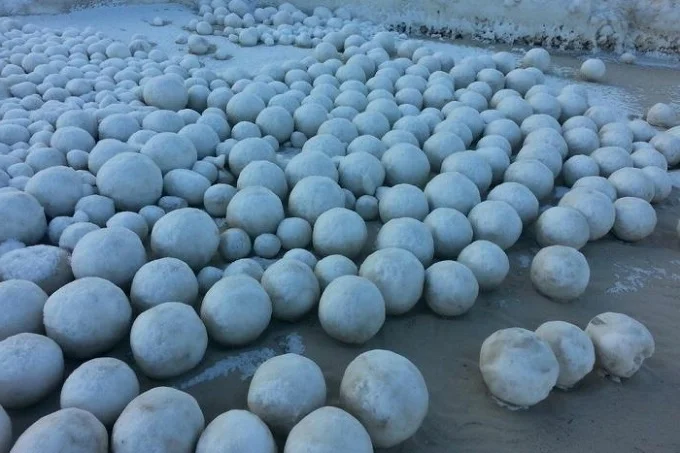This happens very rarely and usually in areas with harsh climates. Under certain weather conditions, ice balls, or, as they are also called, ice eggs, can form on the banks of water bodies.
On such days, the entire coastline is dotted with white “balls”, which is truly a fantastic and mesmerizing picture. Those who are lucky enough to see such ice balls are real lucky ones.
Scientists believe that for the formation of ice eggs in nature, several factors must coincide at once. The weather should not be very warm, but at the same time not very cold. Plus, there should be water nearby, as well as the wind, but not too strong. It drives water, which at this moment gradually freezes.
According to a more accurate version, ice balls are formed because large chunks of ice are washed by water and, at the same time, rolled by the wind as if it were about to make a snowman.
Natural miracle in Siberia
One of the cases of the formation of ice balls was recorded in Siberia. This happened five years ago in the northwestern part of the country, near the village of Nyda (which, by the way, was abolished as a settlement last year). A strange and beautiful sight appeared before the locals in the Gulf of Ob. The 18-kilometer stretch of coast was covered with ice spheres, the diameter of which varied from relatively small (the size of a tennis ball) to almost one meter. The old-timers assured that they had never seen anything like it in these parts.
The media immediately recognized the appearance of the ice balls, and the press secretary of the Arctic and Antarctic Research Institute Sergey Lisenkov even commented, explaining the prerequisites for the formation of such ice spheres. He said then that, as a rule, a primary natural phenomenon occurs first – slime ice (wet ice). This is followed by a combination of wind effects, coastline relief, temperature, and wind conditions, as a result of which these original shapes of ice pieces can form.
Ice eggs in Finland
In 2019, thousands of egg-shaped ice objects covered a beach in Scandinavia. They dotted the coast of Hailuoto Island, which is located in the Gulf of Bothnia between Finland and Sweden. The images of these “snowballs” were shared by amateur photographer Risto Mattila, who happened to be among those who accidentally saw this rare natural phenomenon. In general, nothing special. However, this happened: the water turned into ice eggs, of which there were countless numbers.
According to Risto Matilla’s estimates, they covered an area of about 30 square meters like a carpet. He also clarified that the smallest balls were about the size of an egg, and the largest were about the size of a soccer ball. In a comment to the BBC correspondent, the Finnish photographer admitted that he had never known about such a miracle of nature before.
“It looked amazing. In 25 years of my life in this area, I have never seen such a thing. And since I had a camera with me, I decided to capture this unusual sight for posterity.”
